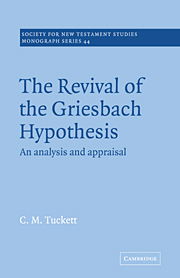Book contents
- Frontmatter
- Contents
- Acknowledgements
- Note on Abbreviations
- Introduction
- Part I Some Aspects of the History of the Study of the Synoptic Problem
- Part II General Phenomena
- 1 Criteria
- 2 Mark's Duplicate Expressions
- 3 The Historic Present
- 4 The Order and Choice of the Material
- 5 Conflated Texts
- 6 Patristic Evidence
- 7 The Minor Agreements
- 8 The Mark–Q Overlaps
- Part III Some Particular Texts
- Conclusion
- Appendix
- Notes
- Abbreviations
- Bibliography
- Index
8 - The Mark–Q Overlaps
from Part II - General Phenomena
Published online by Cambridge University Press: 18 January 2010
- Frontmatter
- Contents
- Acknowledgements
- Note on Abbreviations
- Introduction
- Part I Some Aspects of the History of the Study of the Synoptic Problem
- Part II General Phenomena
- 1 Criteria
- 2 Mark's Duplicate Expressions
- 3 The Historic Present
- 4 The Order and Choice of the Material
- 5 Conflated Texts
- 6 Patristic Evidence
- 7 The Minor Agreements
- 8 The Mark–Q Overlaps
- Part III Some Particular Texts
- Conclusion
- Appendix
- Notes
- Abbreviations
- Bibliography
- Index
Summary
One of the explanations which Streeter used to account for the minor agreements was an appeal to an overlap of sources: both Mark and Q might contain a particular section, and hence Matthew's agreements with Luke could stem from a Q source underlying them both. Many have felt that this theory constitutes a weakness for the 2DH, and others have claimed that the passages in question can be explained more easily by other hypotheses. Thus Devisch says:
Pour ceux qui défendent d'autres solutions du probleme synoptique, les textes que, dans la théorie des deux sources, on appelle généralement ‘les passages qui se recouvrent’, ne font aucun probléme. Ils constituent, au contraire, les exemples les plus probants pour confirmer ces autres théories.
The question to be discussed here is whether in fact these passages can be explained any more easily by other hypotheses, and in particular by the GH.
For the 2DH, the theory of overlapping sources gives rise immediately to interesting problems about the relationship between Mark and Q. If these two sources give two accounts of the same pericope, the question arises as to whether there is any relationship of literary dependence between them. Dependence of Q on Mark has rarely been advocated and is usually rejected. However, dependence of Mark on Q has often been advocated, either as dependence on a recension of Q slightly different from that known to Matthew and Luke, or on Q simpliciter.
Information
- Type
- Chapter
- Information
- Revival Griesbach Hypothes , pp. 76 - 94Publisher: Cambridge University PressPrint publication year: 1983
